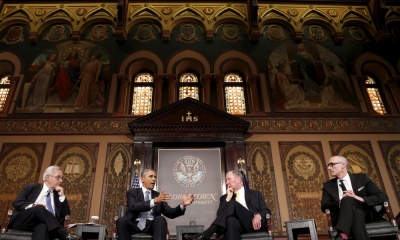Obama Talks Importance of Fathers, Faith at Catholic-Evangelical Summit on Overcoming Poverty

WASHINGTON — President Barack Obama spoke Tuesday about the importance of faith and family during a panel discussion for the Catholic-Evangelical Summit on Overcoming Poverty at Georgetown University.
"Faith-based groups across the country and around the world understand the centrality and the importance of [poverty] in a intimate way — in part because these faith-based organizations are interacting with folks who are struggling and know how good these people are, and know their stories, and it's not just theological, but it's very concrete. They're embedded in communities and they're making a difference in all kinds of ways," Obama said.

The panel was moderated by The Washington Post columnist E.J. Dionne and also included Arthur Brooks, president of the American Enterprise Institute, and Harvard political scientist Robert Putnam.
"When I think about my own Christian faith and my obligations," Obama continued, "it is important for me to do what I can myself — individually mentoring young people, or making charitable donations, or in some ways impacting whatever circles and influence I have. But I also think it's important to have a voice in the larger debate. And I think it would be powerful for our faith-based organizations to speak out on this in a more forceful fashion."
Obama also noted that asking churches to speak out more on poverty may "sound self-interested" because there are other issues where he disagrees with "the evangelical community and faith-based groups," such as abortion and gay marriage.
"But I want to insist," he explained, "... [working to end poverty] is more just a broader reflection of somebody who has worked with churches and worked in communities."
Obama also noted that he speaks about the importance of fathers to, for instance, students at Morehouse College, an all-male traditionally black college, more than Barnard College, an all-female college, because "I am a black man who grew up without a father and I know the cost that, I paid for that. And I also know that I have the capacity to break that cycle, and as a consequence, I think my daughters are better off."
Having that conversation, he added, "does not negate my conversation about the need for early childhood education, or the need for job training, or the need for greater investment in infrastructure, or jobs in low-income communities."
The summit was on its second of three full days of events. It was organized by Georgetown's Initiative on Catholic Social Thought and Public Life, and the National Association of Evangelicals. The goal of the summit is to "make overcoming poverty a moral imperative and urgent national priority." Partner groups participating in the event represent both conservative and liberal evangelical and Catholic groups.
Obama said he has read Putnam's new book, Our Kids: The American Dream in Crisis, which argues that a rich/poor opportunity gap has grown wider in recent years, such that poor kids find it more difficult to find success through hard work.
After Obama pointed out that anti-poverty programs have reduced poverty by 40 percent since 1967, Putnam noted that those programs have reduced poverty for the elderly but they have not helped children much.
Increasingly, he said, opportunities for success are determined by who your parents are. Poor children can be just as talented and hardworking, but their "fate is being determined by things that they had no control over, and that's fundamentally unfair."
Much of the discussion focused on areas where conservatives and liberals can find common ground.
Obama asked Brooks, the only conservative on the panel, if he would support increasing taxes on hedge fund managers to pay for early childhood education.
"If we can't ask society's lottery winners to just make that modest investment, then, really, this conversation is for show," Obama said.
Brooks answered that he does not speak for all Republicans but he would be fine with raising taxes on hedge fund managers. But doing so would not get at the main problem.
"Yes, sure. Fine," he said. "These are show issues. Corporate jets are show issues. Carried interest is a show issue. The real issue? Middle-class entitlements — 70 percent of the federal budget. That's where the real money is. And the truth of the matter is until we can take that on ... if the left and right want to make progress politically as they put together budgets, they're going to have to make progress on that."
Politicians cannot get to a conversation about spending that could help the poor, he continued, because they have not dealt with the entitlement issue.
"We can't even get to [a debate on anti-poverty programs] when politicians on the left and the right are conspiring to not touch middle-class entitlements. ... And when we're on an automatic path to spend tons of money in entitlements that are leading us to fiscal unsustainability, we can't get to these progressive conversations where conservatives and liberals ... work together, potentially, to help poor people," he said.





















